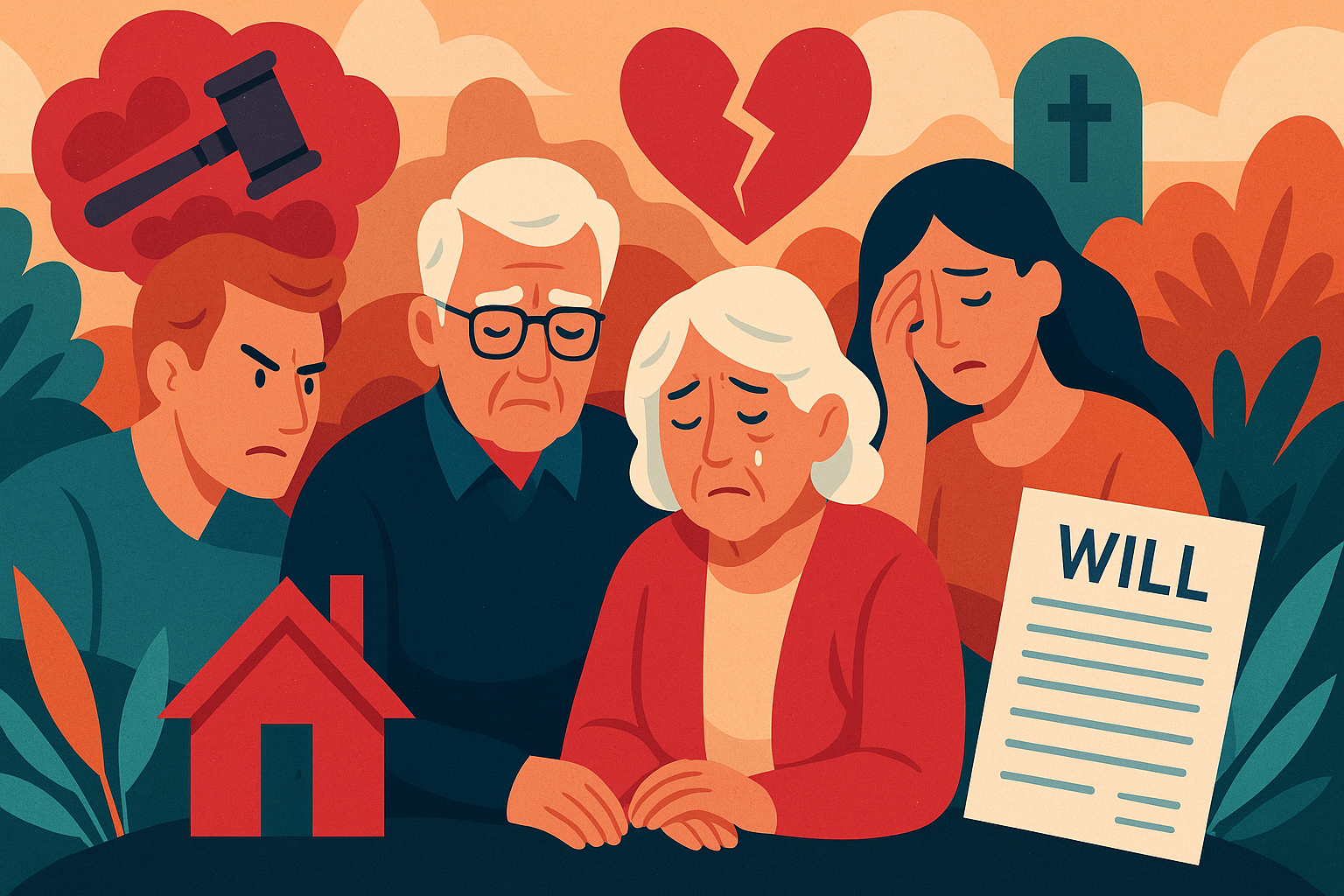
Love, Loss, and Litigation: How Grief Complicates Estate Disputes
Grief has no timetable. It arrives in waves, sometimes sharp, sometimes slow. When a loved one passes away, we expect mourning—not mediation. Reflection—not resentment. Yet in the world of estate law, grief and litigation often walk hand in hand.
At Hackard Law, we’ve seen how unresolved emotions can fuel estate disputes and how heartbreak can cloud judgment. In this post, we explore …why grief and inheritance disputes often become intertwined——and how families can navigate both the legal and emotional aftermath of loss.
The Emotional Collision: Death and Disputes
Grief and inheritance disputes often arrive together—amplifying tension and triggering emotional decisions. But in the midst of this emotional upheaval, families are often thrust into complex legal decisions. The distribution of assets. The reading of the will. Questions of fairness, loyalty, and intent—all while emotions run high.
The result? Small misunderstandings quickly snowball into accusations. Long-standing family rifts resurface. Every decision becomes tinged with emotion. Instead of collective mourning, there’s conflict.
Why Inheritance Disputes Hit So Hard
Unlike many legal battles, estate litigation doesn’t feel abstract. It’s deeply personal. Disagreements aren’t just about money—they’re about meaning.
- “Dad always promised me the house.”
- “Why did she leave more to him?”
- “Was that really what she wanted—or did someone get to her?”
The fight isn’t just over assets—it’s over legacy, love, and the fear of being forgotten. For many heirs, a will feels like a final message from the deceased. If that message feels unfair, exclusionary, or confusing, the wound cuts deeper than any legal slight.
For deeper insights into the emotional complexities of inheritance conflicts, explore our blog on Conflicts Over Inheritance: Why Family Disputes Run Deep.
How Grief Warps Perception
Grief can affect how people interpret facts, conversations, and documents. Clouded memory, amplified slights, and growing space for suspicion.. In grief, a sibling’s reasonable decision may feel like betrayal. A caregiver’s kindness may look like manipulation—another example of how grief and inheritance disputes blur perception and deepen mistrust.
Emotional Misinterpretation of Legal Language
Wills and trusts are legal documents—but for grieving family members, they’re often read through a deeply emotional lens. Phrases that seem routine or neutral to attorneys—like “residuary estate” or “right of representation”—can be interpreted as cold, dismissive, or unfair by heirs still mourning a loss. Legal precision can be mistaken for a lack of affection. Even standard clauses can trigger painful questions: Why wasn’t I mentioned by name? Did they forget me? Did I do something wrong?
This misinterpretation can lead to disputes not over the actual intent of the document, but over the emotional meaning attributed to the way it was written.
Heightened Sensitivity to Perceived Favoritism
Grief often intensifies emotional reactions—and nowhere is this more evident than in how survivors view the distribution of an estate. If one sibling receives more than another, or if a caregiver is named as a beneficiary, the surviving family members may interpret these actions not as legal decisions, but as evidence of favoritism or betrayal.
Statements like “She always loved him more” or “They must have turned Dad against me” often arise from long-standing family dynamics made worse by grief. This sensitivity can lead to bitter disputes—even when the estate plan was rational and legally sound.
Unrealistic Expectations About Inheritance
The emotional impact of losing a loved one often creates expectations that aren’t grounded in legal or financial reality. Some family members may believe they’re entitled to a larger share of the estate based on personal sacrifices, verbal promises, or cultural assumptions about inheritance. Others may assume the estate is larger than it is and feel deceived or disappointed when they see the actual numbers.
These unrealistic expectations, when unmet, can feel like a second loss—one that quickly turns into anger, suspicion, or legal action.
Distrust Toward Those Seen as “Closer” to the Deceased
In the aftermath of a loved one’s passing, proximity becomes a point of contention. If one sibling lived near the deceased or managed their care, they may be viewed with suspicion by others who were less involved. Accusations of manipulation, coercion, or undue influence are common—especially when the “closer” person is named as executor, trustee, or a major beneficiary.
Even if their role was supportive and sincere, the grief and distance of other heirs can breed distrust, fueled by isolation, regret, or guilt over not being more present.
Guilt-Driven Decisions or Legal Inaction
Grief and inheritance disputes can paralyze. Emotional pain sometimes delays justice—or leads to costly concessions. Some individuals hesitate to challenge a will or speak up about their concerns because they fear dishonoring the deceased. Others feel guilt for pursuing litigation, even when there is clear evidence of wrongdoing. This guilt can lead to costly inaction—allowing statute-of-limitations deadlines to pass or enabling ongoing abuse by a trustee or caretaker.
Conversely, grief-fueled guilt may push someone into settling too soon or making generous concessions, not because it’s legally fair—but because they want to avoid additional emotional pain. In either case, guilt distorts judgment and compromises the ability to make sound legal choices.
These reactions aren’t irrational—they’re human. But they can lead to damaging litigation if not handled with care.
The Sibling Spiral: When Rivalries Resurface
For many families, grief reopens old wounds. Childhood rivalries. Parental favoritism. Longstanding resentments. Estate litigation becomes the battleground for grievances that have simmered for years.
“I took care of Mom when no one else would—why should I share equally?”
“He got everything growing up—and now this too?”
Without clear legal boundaries, these emotions take over. At Hackard Law, we help clients separate the emotional from the legal so they can pursue justice without reliving decades of family pain.
The Role of Undue Influence in a Grieving Family
Grief also creates vulnerability—not just for heirs, but for the deceased themselves. Many changes to wills or trusts are made late in life, when a person is emotionally or cognitively fragile. If one family member, caregiver, or outsider exploits that grief to manipulate estate plans, the damage can be permanent.
Grieving families often struggle with questions like:
- Was this change legitimate or coerced?
- Did they truly understand what they were signing?
- Were they isolated or pressured by someone?
These are the exact questions at the heart of undue influence claims—and they often arise when grief and trust intersect.
Navigating Grief in the Midst of Legal Action
It’s possible—and necessary—to grieve and litigate responsibly. The key is awareness, support, and trusted legal guidance. Here are some ways families can balance emotion with action:
Pause Before You React
In the early stages of grief, your emotions may be louder than reason. Give yourself permission to feel—but wait to act until you’ve had time to think clearly.
Seek Trusted Legal Counsel
A compassionate estate litigation attorney can help you navigate your rights while protecting you from the emotional fallout of rash decisions.
Engage Emotional Support
Therapists, support groups, and spiritual advisors can help you process the loss independently from the legal battle. Emotional clarity makes you a better client—and a stronger advocate.
Document with Care
If you suspect wrongdoing, collect documentation calmly and methodically. Avoid confrontations or verbal accusations that may worsen family tensions or weaken your case.
When It’s About More Than Just the Will
Sometimes clients say, “It’s not about the money.” And they’re right. About fairness, legacy, and the need to feel seen and valued in a moment of loss.
At Hackard Law, we believe the legal process should reflect that truth. That’s why we approach estate disputes with more than just litigation strategy—we bring empathy, clarity, and a deep understanding of the emotional terrain our clients are walking through.
Finding Clarity Through Compassion
Love, loss, and litigation are rarely a clean combination. But they are a common one. The pain of losing a loved one doesn’t disappear when legal papers are filed—it often deepens. The key to navigating estate disputes isn’t to suppress grief—it’s to understand it, honor it, and make room for both mourning and justice.
If you’re grieving and facing an inheritance conflict, you don’t have to do it alone. Hackard Law is here to support you—with the legal experience to defend your rights and the compassion to honor your loss.
If you’re facing challenges with grief and inheritance disputes, don’t navigate this journey alone. Contact Hackard Law today for compassionate legal guidance tailored to your family’s needs.

 (916) 775-8542
(916) 775-8542 